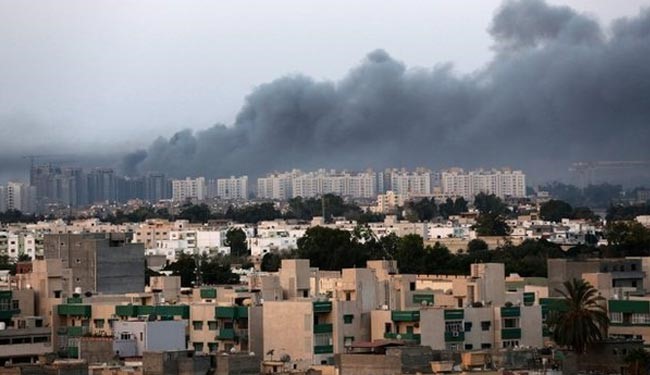
Archive: A rebel fighter looks at a burning vehicle after an air strike, along a road between Benghazi and Ajdabiyah March 20, 2011 (Reuters / Goran Tomasevic)
When asked if Egypt would provide military support to the United States-led coalition to “degrade and destroy” the Islamic State in Jeddah, Egyptian Foreign Minister Sameh Shoukry defended his country’s lack of willingness.
“It is not at all logical for us to mobilize our resources together to defeat [Islamic State] while these resources are obscured from Egypt as it fights its own battles against this common enemy on its own lands,” said the Egyptian Foreign Minister.
In other words, Egypt would not be lending aerial nor ground military support in Syria or Iraq against the Islamic State anytime soon. Instead, Shoukry signalled that Egypt would be diverting its military might and attention to the Islamist militants in the Sinai.
Even Lebanese Foreign Minister Gebran Bassil told Agence-France Presse that in the meeting in Jeddah, a senior Egyptian foreign ministry official affirmed Cairo’s support of “all international efforts to fight terrorism” and would “support U.S. efforts politically.” However, any type of Egyptian military support would have to be supported “under a U.N. mandate and in the framework of a Security Council resolution.”
Egypt’s refusal to commit forces against a threat that is seemingly at their doorstep seems incongruous. Even graver is that it left the coalition without the military support of the largest and most seasoned army in the Arab region; the only other Arab army that was larger and seasoned in combat was Saddam Hussein’s Iraqi army.
So as to not appear rejecting any interest in aiding the coalition to bout out the extremism of the Islamic State, Egypt made a strong case for the protection of state sovereignty under the strict measures of international law. In addition to protection of sovereignty, President Abdel Fattah al-Sisi indicated that Egypt is diverting its resources to uprooting their own extremism at home – which has seen an upsurge since the ouster of Mohamed Morsi.
The seemingly strong support for state sovereignty came to a halt when the United States accused Egypt and the United Arab Emirates of launching coordinated airstrikes against Tripoli on August 24. Egypt denied the claims while the UAE refused to comment. The strikes came a day after Islamist militants captured the Tripoli airport, killing 13 fighters. While both nations deny their participation, it is clear that Egypt considers its western neighbor at the top of its threat list for its porous border, allowing the flow of weapons and militants into Egypt.
Last week, new allegations surfaced of renewed Egyptian airstrikes — this time in Benghazi and involved exclusive of coordination with the UAE. Again, Egypt denied any participation in the airstrikes.
According to The Associated Press, Libyan lawmaker Tareq al-Jourshi confirmed that Egyptian warplanes were used for the operation on a “rented” basis flown with Libyan pilots. Two unnamed Egyptian officials, who spoke to The Associated Press on condition of anonymity, affirmed that this is the first leg of an Egyptian-led campaign against Libyan militants. The latter portion of the campaign will be supported by Egyptian-trained Libyan ground troops. According to the senior official, “This is a battle for Egypt not Libya.”
TURMOIL IN LIBYA
Since the ouster and slaying of Muammar Qaddafi three year ago, Libya is being thwarted into a downward spiral of violence and strife with Islamist insurgency and tribal clashes at the bedrock of the proxy war.
After returning to Libya from exile in Northern Virginia during the Libyan uprising of 2011, Major General Khalifa Hiftar fomented his role in Libya’s transitional roadmap in a familiar way: by announcing a military takeover, the swift suspension of the ineffective Parliament, and a new “roadmap” for the future. Among those important items in the new roadmap is Operation Dignity, launched to weed out insurgents who have made large gains in the takeover of Benghazi.
While the United States is campaigning to gain a secured coalition against the Islamic State, al-Sisi has been reiterating the need to extend the campaign to Libya, Sudan, Yemen and the Sinai Peninsula, which he alludes are sweltering hotbeds for extremism. These are grounds for the same type grassroots extremism that paved the way for the Islamic State.
The new potential conflict extends along Egypt’s 1,000-kilometer western border with Libya. As the conditions inside of Libya deteriorate, the spread of extremist organizations armed with weapons left behind by the Qaddafi regime is proving to be a clear threat for the Egyptian neighbor.
On July 19, 21 Egyptian soldiers were killed by militants at the Farafra checkpoint near the Libyan border after militants fired an RPG into their ammunitions cache. Analysts cite Ansar al-Sharia, a Libyan-based Islamist militia responsible for the attack on the U.S. Consulate in Benghazi in 2012, as the culprit of the attack. Reports are still unclear as to who carried out the attack – but what is known is that the militants were in possession of varying long-distance range weaponry, including RPGs, sniper rifles, and AK-47 automatic rifles.
On October 8, Egypt and Libya’s prime minsters announced that Egypt will train Libyan forces on counterterrorism to strengthen their shared border in the effort to counter militants and insurgents. Reportedly, fifteen ISIS members, led by an Egyptian and Saudi national, traveled to Libya to plan an Islamic State cell in Libya, pitting Egypt between simmering insurgency in Libya and unceasing belligerence in the Sinai.
